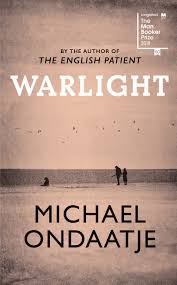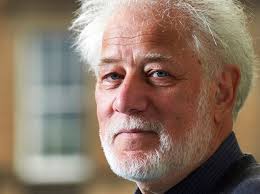Warlight by Michael Ondaatje, UK, 2018
 This is a beautifully written book set in the period directly after the end of the Second World War. It is a time when everyone is thinking of peace, while there are still strands of the war cutting through everything that seems normal. We may think that the war is over, but it follows us into the present.
This is a beautifully written book set in the period directly after the end of the Second World War. It is a time when everyone is thinking of peace, while there are still strands of the war cutting through everything that seems normal. We may think that the war is over, but it follows us into the present.
The narrator is Nathaniel, now in his late twenties, and he begins the book, looking back to when, as a fourteen year old, he was left to fend for himself with his two-year-older sister, Rachel. The children were left in the care of strangers after their parents, first their father and then their mother, leave the family home in London. The children have been told that their father must move to south-east Asia because of work commitments, and when their mother leaves a month later, she tells them that it is to join him. There is no mention of how long the parents will be away.
As the book evolves we learn that Nathaniel’s mother, Rose, was a spy during the war and it is, therefore, interesting that almost everyone in the book has a nickname: Nathaniel and Rachel are called Stitch and Wren by their mother; and then there are the Moth, the Darter and Agnes (after Agnes Street). Is it that there are two levels to reality – that which we see and are aware of and that which we do not see? Nothing is as it seems, and everything has a veneer of secrecy.

The Moth, the children’s guardian, and the Darter, who fixes dog races – both of them most probably small-time criminals – together with a collection of people who come and go, offer Nathaniel and Rachel some sense of family, even if what they offer is outside of what might be considered normal and often outside of the law. But even this dubious sense of home and security is shattered when something dreadful happens and the two children are sent in two completely directions. Years later when Nathaniel is living in the country and working at the Foreign Office in an attempt to find out more about his mother, the two siblings have become strangers to each other.
Gradually we learn more about Rose, who she was and what she had been doing, and all the many disparate pieces that make up the story, come together, tying all the characters and events together into a whole. This is a story that will touch you on many different levels and which will remain with you, long after you have read the last page.
As Ondaatje says at the end of the book: ‘We order our lives with barely held stories. As if we have been lost in a confusing landscape, gathering what was invisible and unspoken (…) sewing it all together in order to survive, incomplete, ignored like the sea pea on those mined beaches during the war.’
An interview with Michael Ondaatje
Photo of Michael Ondaatje from noted.co.nz